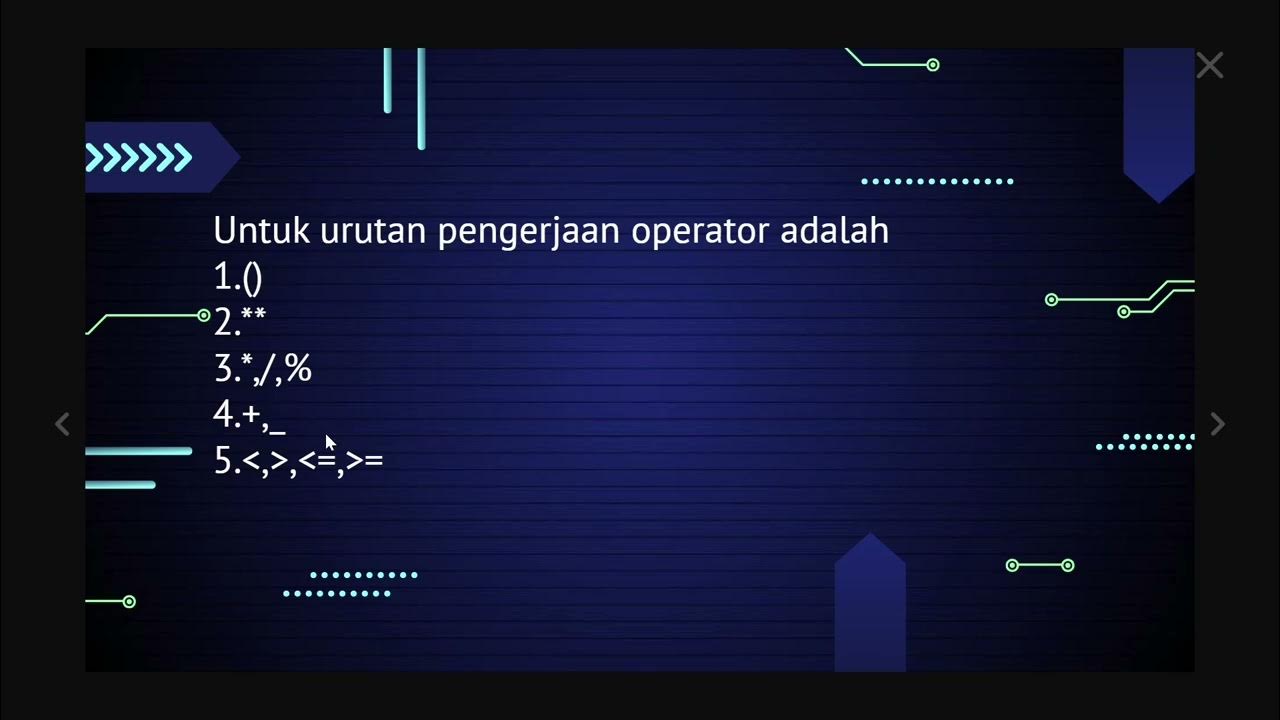Comparison Operators in JavaScript Explained in Hindi | The Complete JavaScript Course | Ep.10
Summary
TLDRIn this video, the speaker introduces JavaScript comparison operators, explaining their function and behavior when comparing values. The tutorial covers operators like equality (`==`), strict equality (`===`), not equal (`!=`), greater than (`>`), and less than (`<`), highlighting the differences in implicit vs. explicit type conversions. Key concepts such as implicit conversion (automatic behind-the-scenes type changes) and explicit conversion (manual type changes) are discussed. Viewers are encouraged to use strict equality and manual conversion to avoid unexpected behaviors, making comparisons more predictable and reliable in JavaScript.
Takeaways
- 😀 Equality operator (==) performs implicit type conversion, meaning it converts values to the same type before comparing them.
- 😀 Strict equality (===) does not perform type conversion; it compares both the value and the type of the operands.
- 😀 Implicit type conversion can lead to unexpected results, so it's generally better to use strict equality (===) to avoid errors.
- 😀 When comparing numbers and strings, JavaScript will automatically convert strings to numbers behind the scenes, but this behavior can be unpredictable.
- 😀 For more control over type comparison, always use explicit conversion (e.g., using `parseInt()` or the `+` operator) before comparing values.
- 😀 The not equal operator (!=) checks if two values are not equal but may perform implicit conversion, leading to potential issues.
- 😀 Strict not equal (!==) checks both the value and the type of the operands, ensuring no implicit conversion happens during the comparison.
- 😀 JavaScript lacks a strict version for comparison operators like greater than (>) or less than (<), so it uses implicit conversion when comparing.
- 😀 The best practice is to convert values manually before comparing them to avoid issues with JavaScript’s automatic type coercion.
- 😀 Comparison operators in JavaScript always return Boolean values (true or false), which are useful when working with conditionals and control flow.
Q & A
What is the purpose of a comparison operator in JavaScript?
-A comparison operator is used to compare two values, typically numbers, and returns a Boolean result (true or false). It helps in making decisions in the code, like checking if two values are equal or if one is greater than the other.
What is the difference between the equality operator (==) and strict equality operator (===)?
-The equality operator (==) compares values but allows implicit type conversion, meaning it will convert values to the same type before comparing them. The strict equality operator (===) compares both the value and the type, and does not perform type conversion, ensuring a more precise comparison.
What is implicit conversion in JavaScript?
-Implicit conversion, also known as type coercion, occurs when JavaScript automatically converts one data type into another (e.g., a string to a number) behind the scenes during a comparison or operation.
Why should you avoid using the equality operator (==) for comparisons?
-You should avoid using the equality operator (==) because it can lead to unexpected results due to implicit type conversion. For example, comparing a string and a number might give a result you don't expect if JavaScript automatically converts the types.
What is the significance of using the strict equality operator (===)?
-The strict equality operator (===) ensures that both the value and the type are exactly the same before returning true. It helps avoid issues caused by JavaScript's automatic type conversion, ensuring a more predictable and reliable comparison.
What happens when you compare a string '18' with a number 18 using the equality operator (==)?
-When you compare a string '18' with a number 18 using the equality operator (==), JavaScript performs implicit conversion and converts the string to a number before comparing. Since both are now the same number, the result will be true.
What is the purpose of the inequality operator (!=) in JavaScript?
-The inequality operator (!=) checks if two values are not equal. If the values are different, it returns true; if they are equal, it returns false. Like the equality operator, it allows implicit type conversion.
What is the strict inequality operator (!==) and how is it different from !=?
-The strict inequality operator (!==) checks both the value and the type, ensuring that both are not equal. Unlike !=, which allows implicit type conversion, !== returns false if the values have the same type but are not equal.
Are there strict versions of the greater than (>) and less than (<) operators?
-No, there are no strict versions of the greater than (>) or less than (<) operators in JavaScript. These operators perform implicit type conversion behind the scenes when comparing values, so it's important to manually convert types when necessary.
How can you manually convert a string to a number in JavaScript?
-You can manually convert a string to a number using methods like `parseInt()` or `Number()`. For example, `parseInt('18')` or `Number('18')` will convert the string '18' into the number 18.
Outlines

This section is available to paid users only. Please upgrade to access this part.
Upgrade NowMindmap

This section is available to paid users only. Please upgrade to access this part.
Upgrade NowKeywords

This section is available to paid users only. Please upgrade to access this part.
Upgrade NowHighlights

This section is available to paid users only. Please upgrade to access this part.
Upgrade NowTranscripts

This section is available to paid users only. Please upgrade to access this part.
Upgrade NowBrowse More Related Video

ES6 #1: Spread & Rest Operator in ES6 in JavaScript in Hindi | Technical Suneja

ALGORITMA dan PEMROGRAMAN || OPERATOR

C_16 Operators in C - Part 4 | C Programming Tutorials

Belajar Python [Dasar] - 10 - Operasi Komparasi

Comparison, Logical, and Membership Operators in Python | Python for Beginners

Lecture 32 : Improper Integral – Part 2
5.0 / 5 (0 votes)